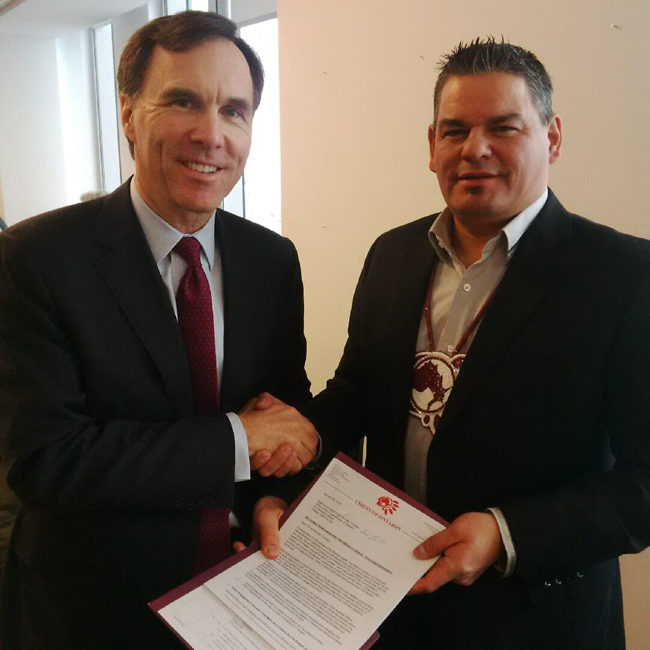Regional Chief Day presents 2016 pre-budget submission calling on feds to commit to major investment in First Nation communities

OTTAWA – Ontario Regional Chief Isadore Day released the following statement after meeting and presenting a Pre-Budget Submission to Federal Finance Minister Bill Morneau in Ottawa on Jan. 28.
“The Chiefs of Ontario 2016 federal pre-budget submission (PBS) is the first significant opportunity for this government to begin a new fiscal relationship and to concretely address the Calls to Action of the Truth and Reconciliation Commission (TRC).
Now is the time to implement Prime Minister Trudeau’s commitment to “sufficient, predictable and sustained funding” for First Nations communities. It is the first step in guaranteeing a real nation-to-nation approach that strengthens both First Nations and Canada.
With the government recognizing and acknowledging the decades of accumulated shortfall in effort and investment in First Nations communities, it is vital for our people that funding priorities are clearly outlined in the pre-budget consultation process.
In the months to come, government must sit down with our leaders to hammer out an equalization framework that sets out clear and concrete measures to fix and safeguard against the grinding poverty that is crippling and killing far too many First Nation citizens across this country. We need significant front-end investments in health, housing, water, child care, education, justice, and economic development.
First Nations must be a top priority in shovel-ready infrastructure projects from clean water to housing, from green energy to transportation. As well, both federal and provincial governments can fast-track much needed health funding that will directly address high levels of poverty. We want results and measured outcomes. The system needs to be fixed.
We are looking to this government to address five key challenges: Ending the First Nation health crisis; Implementing mental health and addiction services to address the youth suicide crisis; Eliminating abject poverty through investments in social infrastructure including housing, water, education and training; Recognizing First Nation authority over land and resources and our Treaties; and Making new technologies such as broadband internet and green energy accessible.
In 2004-5, all levels of government – federal, provincial, territorial and aboriginal – spent 18 months negotiating the $5.1 billion Kelowna Accord which, if implemented, had a 10-year target of improving health, education, and employment rates by 50 per cent, which included nearly $2 billion over the first five years for housing and safe drinking water. Three years ago, Indigenous and Northern Affairs Canada estimated the funding gap for First Nation infrastructure (housing, schools, water systems) at $8.2 billion.

